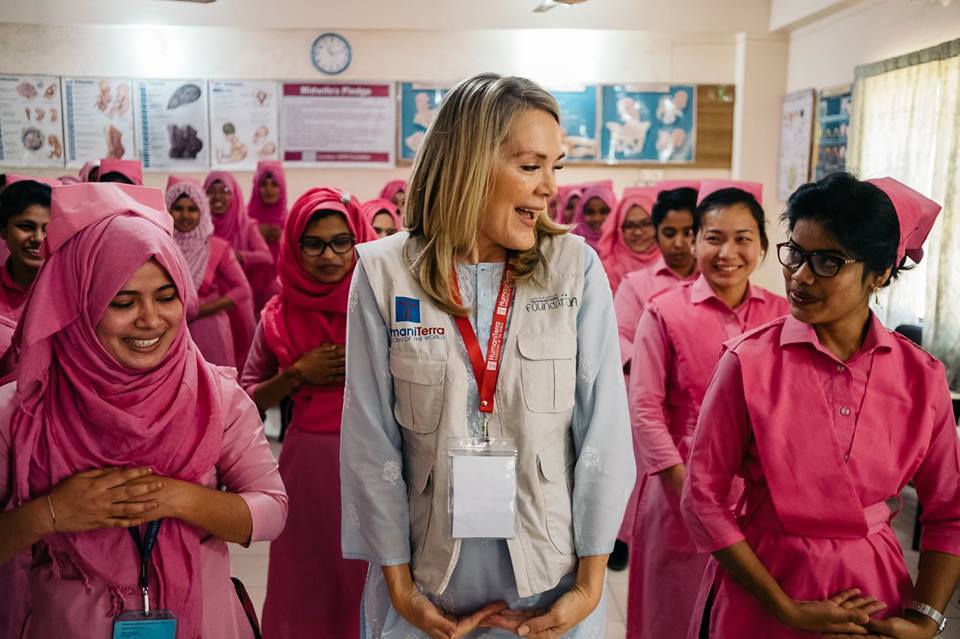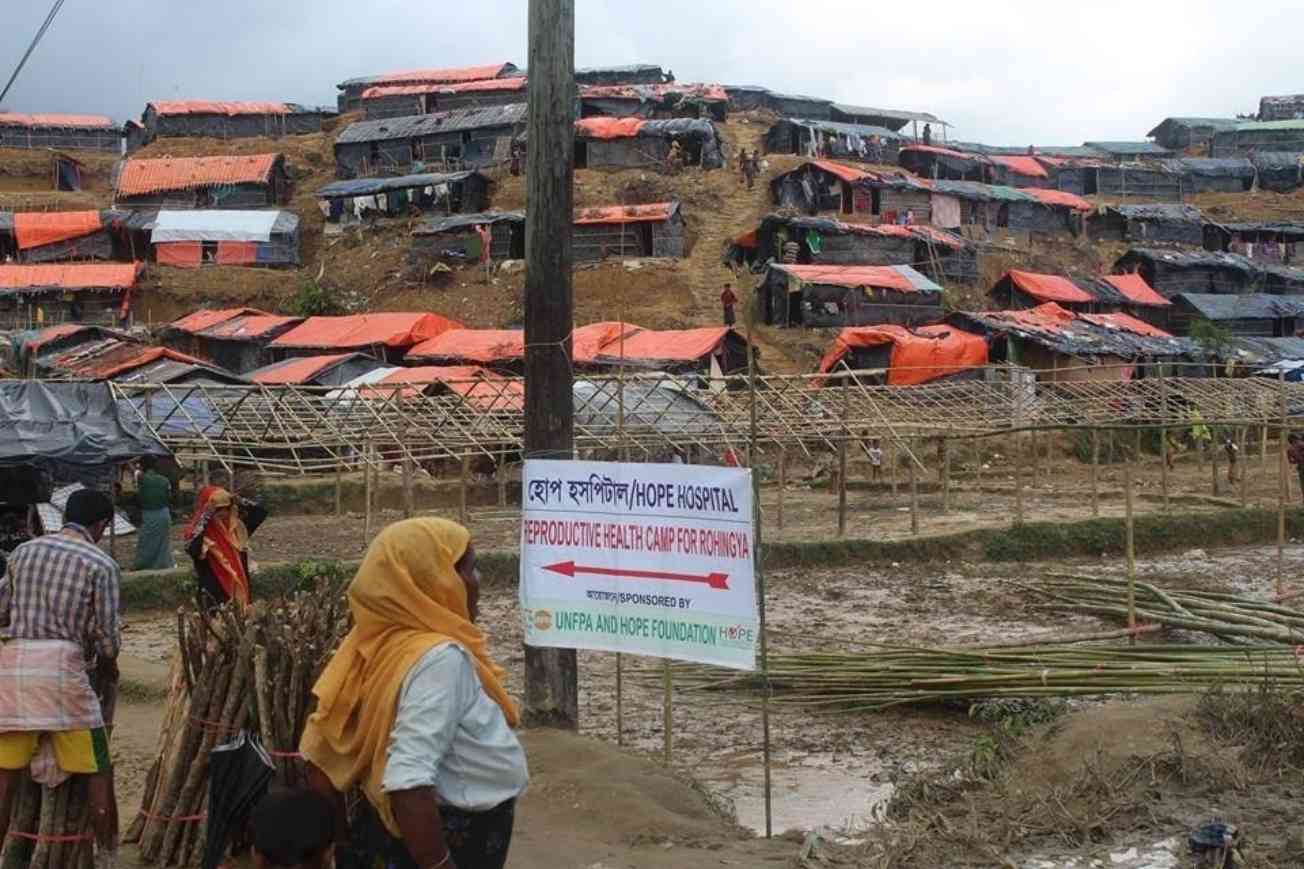Their Story is Our Story (TSOS) visits HOPE Field Hospital for Women where aspiring midwives train to combat maternal mortality

Their Story is Our Story (TSOS) is currently in Bangladesh to gather the stories of some of the 725,000 Rohingya refugees who have escaped extreme violence in Myanmar and who now live in Cox’s Bazar - the largest refugee settlement in the world where, according to UNHCR, over half of the residents are children.
Here is our report from our second day on the ground.
Their Story is Our Story (TSOS) has come to HOPE Field Hospital for Women, the first 24/7 Bangladeshi-run field hospital operating in Cox’s Bazar refugee settlement.
Hope Foundation for Women and Children of Bangladesh was one of the first local responders on the ground as hundreds and thousands of Rohingya refugees poured into Bangladesh to escape the ethnic cleansing in their own country of Myanmar; a country where they had been denied citizenship, rendered stateless, and then murdered, tortured, raped, abused and starved.
The HOPE team continues to provide critical health care to this vulnerable community through the newly-opened 40-bed hospital, which is located in the outskirts of Cox’s Bazar and serves a catchment area of more than 200,000 people. It is the only facility to use solar energy as a main source of power. HOPE also operates 10 mobile health clinics inside the Kutupalong/Balukhali refugee camps and manages the largest fleet of emergency vehicles operating around the clock. (Source: HOPE Foundation for Women and Children of Bangladesh)
Here, thirty trainee midwives in their pink uniforms - some as young as 19 - greet Their Story is Our Story (TSOS) at the HOPE Field Hospital for Women.
“We love being a midwife... Deep down in my soul... So deep deep so down down... Deep down in my soul”
Young midwifes are on the frontline in Cox’s Bazar, where nearly 48,000 babies were expected to be born in the camps in 2018, according to a Save the Children report published in January 2018 - that’s 130 live births per day. The children are born in basic tents with poor sanitation and are at extremely high risk of diphtheria, measles and cholera.
During our visit, we learn that the trainees will acquire the skills to accompany delivering mothers through to birth, with the goal of dramatically reducing the maternal mortality rate from 170 per 100,000 to 50 per 100,000.

As well as the unsanitary conditions in the camp, midwives face another challenge: education. Many of the Rohingya women are deeply suspicious of hospitals and medical-care providers - they were denied the right to access health information and services in Myanmar - and some are forbidden to enter the HOPE Field Hospital for Women by their families. “I’ve heard that they take away your babies in hospitals or kill them,” says Hussain Ara, who is pregnant with her fourth child. (Source: Devex)
HumaniTerra, a non profit organisation that improves access to surgical care to vulnerable and impoverished populations, is hosting Their Story is Our Story (TSOS) during our time here in Cox’s Bazar. We learn that many of the women and young girls have been sexually assaulted, tortured and raped, not only by the military back in Myanmar, but also within this vast camp. Rape victims and the children who are products of rape are shunned by their own people, and so these mothers - some of whom are young teenagers - often try to end their own pregnancies by dangerous means, or do not seek medical help with the pregnancy, due to shame.
The organisation emphasizes the training of local populations, such as the young and aspiring midwives of HOPE Field Hospital for Women, here in Bangladesh. We’ve been highly impressed by their communication with Their Story is Our Story (TSOS) and the measurable, socially responsible impact that the organisation achieves. HumaniTerra is bringing more and more local medical experts on board, not only to minimize the cultural chasm between patient and caregiver, but also to empower the locals in an often tense and fraught dynamic. The future of Cox’s Bazar refugee camps is absolutely dependent on the local Bangladeshi community.
It’s difficult to imagine how a woman or a young girl could go through this: to be used as a weapon of war, to run for her life, to reach a country of “safety” and, in the very best of circumstances, to be looking over her shoulder as she quickly goes to the toilet at night. We hope that these women - who have already been through too much in one lifetime - will trust us with their stories.
Tomorrow, we will posting our third diary entry of our story-gathering trip to Cox’s Bazar, Bangladesh. Read yesterday’s entry.
HOW YOU CAN HELP
Share refugee stories online and in life amongst your friends and colleagues to help challenge misconceptions and misunderstandings about refugees to aid integration and acculturation in communities.
Donate to Their Story is Our Story (TSOS) so that we can continue sharing refugees’ personal stories.
Donate to Hope Foundation for Women and Children of Bangladesh so that Hope Field Hospital for Women can continue to provide a safe haven for women and children inside the Refugee Camps.
Get involved with HumaniTerra by donating funds or volunteering to work on the ground to help rebuild the care system in a sustainable way.
Authors: Emma Nobes and Melissa Dalton-Bradford
Lead image credit: Christophe Mortier
Official Statement on the Detention of Refugees and Ongoing Community Violence
With another death in Minnesota and continued violence toward individuals and groups standing up for their communities, we acknowledge the profound fear and uncertainty people are feeling--not just locally, but across the country.
On top of this, there are reports that refugees invited and admitted to our country through the U.S. Refugee Admission Program are now being detained, meaning that our new friends and neighbors feel that fear most acutely.
Refugees have already fled violence and persecution once. They came here legally, seeking safety. In moments like these, we reaffirm our commitment to building communities where refugees and immigrants can live without fear. Where they can go to work, send their children to school, and build lives of dignity and belonging.
We call for due process, accountability, and humanity in all immigration enforcement operations. We call upon our leaders to demand the demilitarization of our neighborhoods and cities. And we call on all of us to continue the work of welcoming and protecting those who have been forcibly displaced from their homes.